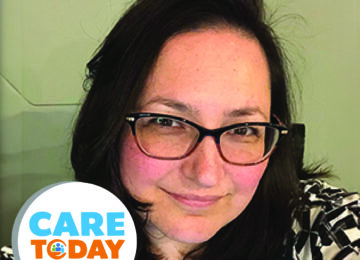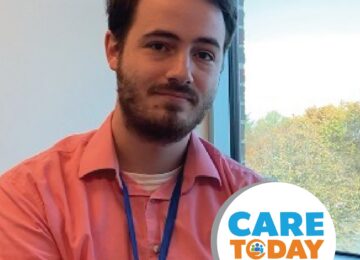Parent Praises JSSA’s Mental Health Counselor for Supporting her Son with Autism: “It’s been Life-Changing.”

For years, Deborah struggled to find effective counseling for Erich, her son, who was diagnosed with autism at age six. Since he was eight, Erich’s seen numerous counselors, yet it was hard for Deborah to ignore the cycle of progression and regression. Now 24 years old, Erich displayed an eagerness to live more independently. As a parent, Deborah wanted nothing more but to see her son succeed.
“I think he has had so much trauma in his life because of his autism and how people treated him,” Deborah said. “He’s a loner, but he wants friends, and he wants to be accepted…he wants to be successful and participate in the community.”
After a recommendation from her healthcare provider, Deborah reached out to JSSA. That’s when she says everything changed for the better.
Using JSSA’s holistic approach to care, Erich became the focus, not just one individual problem. Moreover, because JSSA accepts most major insurance for clinical services, Erich’s care was covered. JSSA assigned Erich to Licensed Professional Counselor Rachel. It was then Erich’s care became a team effort.
At first, Deborah says it was the responsiveness that initially caught her off guard.
“Rachel responds before 24 hours have passed,” she said. “She is not just a counselor but a partner in care.”
Before receiving care from JSSA, Deborah described how there were times Erich would lash out or send inappropriate emails when frustrated. Through counseling, Erich has learned how to manage his frustrations more appropriately. Additionally, Deborah learned something new about Erich. Rachel discovered it could take around five days for Erich to process things. This revelation was “life-changing” and is just one example of how JSSA’s care has helped improve Erich’s overall well-being and how his family responds to support him.
“How can you be angry at someone who has not processed?” she said. “He’s now 24, and he’s been going to counseling since he was eight. No one else has figured this out.”
Now the entire family is more equipped to respond to Erich better. For example, Erich’s father interrupts him less to give Erich more time to process. Moreover, Rachel enables Deborah to take the tools Erich is learning in counseling and reinforce them at home.
With a community-based healthcare background, Rachel’s training led her to look beyond counseling Erich and promptly register him for JSSA’s Youth in Transition Program (TAY). This program helps young people ages 16 to 25 acquire the tools needed to advocate for themselves and gain independence. The program is provided free of charge to any resident of Fairfax County. JSSA’s TAY program addresses issues face as they approach adulthood, such as: seeking housing, finding a job, getting a GED, and learning how to manage money.
Since Erich was 24, Rachel knew time was of the essence, and she knew the Youth in Transition program would benefit Erich’s goals. Additionally, Erich is learning to self-reflect and understand that his choices have a cause and effect. Erich is learning the importance of managing the money he makes from his job. While Erich would spend too much money on gifts for his family in the past, now he understands the importance of budgeting and saving the paycheck he receives from work.
Rachel works with Deborah and Erich as a family unit. Deborah receives updates from Rachel on Erich’s progress. She is told where Erich needs consistent reinforcement at home.
Through JSSA’s mental health services, Erich received a tailored, individualized program addressing his needs, and Deborah was informed every step of the way. Through counseling, it was recognized that Erich does not respond to negative consequences but instead to consistent positive reinforcement.
“Erich internalizes negative consequences. It doesn’t support change for him, so it’s about recognizing what motivator actually works for him,” Rachel explained.
Since reaching out to JSSA, Deborah has seen consistent and sustainable improvements in Erich.
“I see a difference in how he responds,” Deborah said. “For the first time, I have a conscientious provider who is part of the process.”
Erich emails Rachel with questions or concerns, and consistent communication is prioritized. Through JSSA, the counseling Erich receives is virtual, allowing for more flexibility. Deborah says she notices changes in Erich in that he is more thoughtful about his behaviors.
For Deborah, the support Erich received from JSSA has made the ultimate difference. Now, Erich is receiving the support and reinforcement he needs to succeed.
“There is a true desire to see Erich successful and be happy, which is important to me,” Deborah said. “I can’t say that was at the forefront for any other person who saw him, but I have no doubt in my mind with Rachel.”



